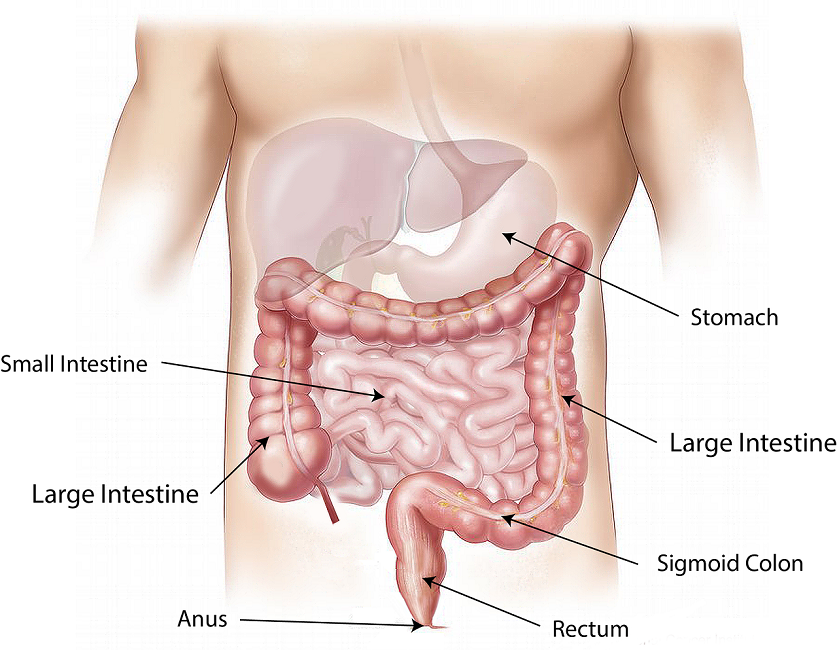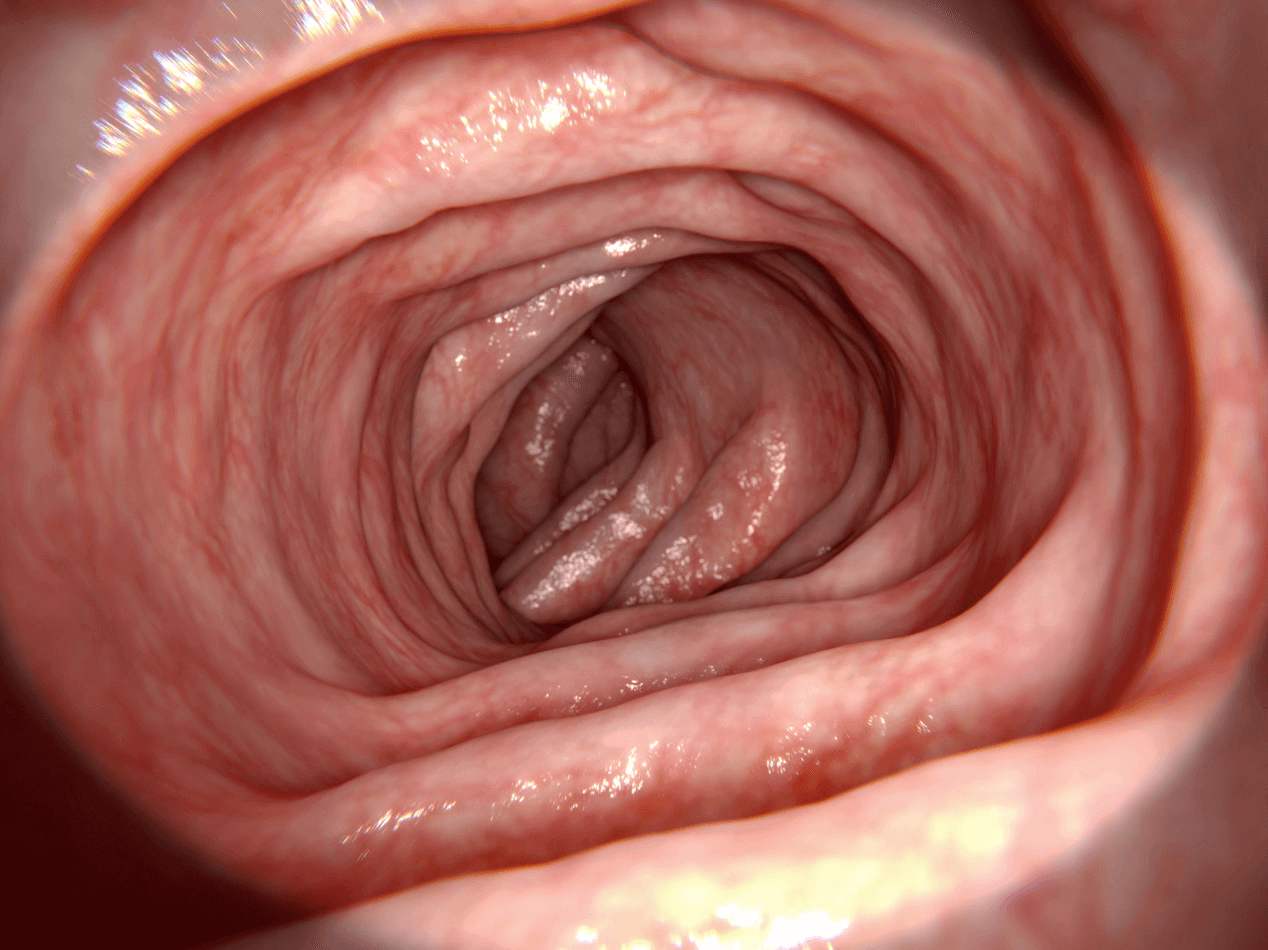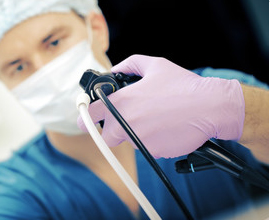What is Flexible Sigmoidoscopy?
Flexible sigmoidoscopy is an endoscopy test to examine the lining of the left side of the large bowel (left colon). This includes examination of the rectum, sigmoid colon and left/descending colon. It is similar to colonoscopy but is a more limited yet quicker and slightly simpler examination. A flexible sigmoidoscopy is carried out using a thin, flexible tube known as a colonoscope. It is an Outpatient test which is fairly quick usually lasting around 10 minutes, although cases requiring treatment may take slightly longer. Following the procedure, you may be advised to stay in hospital for up to 2-3 hours after the procedure.

Indications for Flexible Sigmoidoscopy
A flexible sigmoidoscopy might be recommended to investigate the following symptoms:
- Rectal bleeding
- Abdominal pain
- Change in bowel habit
- Diarrhoea
- To check for haemorroids
- To check for diverticular disease
- To check for/ remove polyps in the left colon
- To check for colorectal cancer in the left colon
- To check/assess for ulcerative colitis
- To check for defecation disorders (e.g. Post baby delivery)
Alternatives to Flexible Sigmoidoscopy
Flexible sigmoidoscopy is a safe and relatively straight forward test. An alternative examination is a barium enema examination. This is a less invasive test but involves a small dose of radiation. It has the disadvantage that it is not possible to take bowel samples or biopsies particularly if an abnormality is found. If this is the case subsequent endoscopic examination may be required. Flexible sigmoidoscopy is also more accurate than a barium study.

Preparing for Flexible Sigmoidoscopy
Please ensure you tell Dr Goel and the endoscopy team before the day of the procedure if you:
- Are diabetic
- May be pregnant
- Have a cardiac pacemaker
- Have a implantable cardiac defbrillator
A strict diet must be followed before the procedure to ensure the bowel is clear of stool and ensure a clear view of the bowel for examination. Drink plenty of fluids, e.g. 2 Litres per day for at least 3 days before the test and avoid eating foods which are high in insoluble fibre (e.g. Bread, nuts, jams, jacket potatoes) for at least 24 hours before the test.
On the day of the procedure, you will be given an enema. An enema (a small bottle with a nozzle device inserted into the rectum) is used to cleanse the left side of the large bowel. This is important for the examination so the endoscopist can accurately examine the bowel lining without missing any abnormalities. The enema is painlessly administered by a nurse at the Hospital before your procedure. The enema is gently inserted into the rectum and the bottle squeezed to expel liquid into the bowel.
Medication Advice
Most usual medications can be continued up till the procedure, however, specific precautions may be taken in some cases. If taking constipating agents such as iron tablets, loperamide (Imodium), codeine phosphate, etc., these should be stopped 1 week prior to examination. Also, if taking any blood-thinning drugs (e.g. Clopidogrel, warfarin, apixaban), it is particularly important to discuss these with Dr Goel or your nurse beforehand so appropriate advice can be given. Please also mention any allergies you may have in advance of your test.
The Flexible Sigmoidoscopy Procedure
Upon your arrival, you will be greeted by a member of staff who will help you prepare for your procedure. Your nurse will ask you a few pre-assessment questions and you should inform them of your medications, allergies and any potential concerns. You will also be asked about your arrangements for getting home. You will have a chance to discuss any concerns and ask any questions to ensure you understand the procedure. Dr Goel will discuss the procedure with you and ask you to sign a consent form.
Your nurse will ask you to remove your lower garments and change into a hospital gown in a private changing area. A nurse will help you with the enema bowel preparation. You will have an opportunity to visit the toilet and evacuate your bowels. Once ready, you will be escorted into the procedure room where the endoscopy nurses will introduce themselves and you will have the opportunity to ask any more questions.
You will be asked to lie on a trolley on your left side. The nurse will monitor your oxygen levels during the procedure with a simple finger probe. A simple rectal examination will be performed which also serves to lubricate the anal passage. The colonoscope will be gently inserted into the rectum (back passage) and the examination usually takes about 5 – 15 minutes to complete. The procedure is usually painless but some patients experience bloating and slight discomfort within the left side of the abdomen but this usually passes quickly. A nurse will be with you at all times to talk to you and also explain what is happening as well as monitoring your oxygen levels and heart rate.
In some cases, a biopsy may be taken from the lining of the bowel which is quite routine and these are sent for analysis. Photos are routinely taken for records and quality assessment. If necessary, small instruments may also be passed through the colonoscope, for example, to remove polyps (usually benign growths). If a polyp is found, it is usually advised to undergo further colonoscopy examination at a later date to check for polyps in the rest of the bowel.
Sedation and Anaesthesia
A flexible sigmoidoscopy can be performed with or without an intravenous sedative. Patients may choose sedation at it can make the procedure more comfortable and reduces anxiety. Sedation often makes you drowsy after the procedure and you will require an escort to take you home. You will have the opportunity to discuss your preference with Dr Goel before your procedure. Following the procedure, Dr Goel will explain the results of your procedure and answer any questions you may have. It is always advisable to arrange a follow-up appointment to discuss findings (and any awaited biopsy results), particularly if you are tired and drowsy following the procedure as you may not recall what is said. You will be monitored in a recovery bay until the medication has worn off. After sedation, you should avoid driving or operating heavy machinery for 24 hours after the procedure. Sedation is very safe, however, there is a very small risk of over-sedation and with any medication there is a small risk of side-effects.
After the Flexible Sigmoidoscopy Procedure
After the procedure, you may feel slightly bloated from air introduced into the bowel during the test, however, this usually passes within a few hours. You will be taken to a recovery area and allowed to rest for as long as necessary whilst observations are made. You can usually eat and drink straight away.
Dr Goel will give you a full written report and explain the findings as well as any treatment or further investigations required. Patients receiving sedation feel very relaxed and sedation can also temporarily affect memory. It is good idea to have an escort (e.g. A family member or friend) with you so the test results can be discussed together. Your escort will be asked to accompany you home when you are ready to leave the department.
If you begin to experience severe pain or experience any bleeding after being discharged, you should see an emergency doctor right away.

Risks of Flexible Sigmoidoscopy
Flexible sigmoidoscopy is generally very safe and complications are rare. The overall complication rate is approximately 1 in 5000 cases. Possible complications include drug allergies, making a small hole in the bowel (perforation), bleeding and over-sedation. Removal of a polyp (polypectomy) carries a risk of 1 in 500 of causing perforation and a 1 in 100 chance of causing bleeding. If a complication does occur, some cases can be managed at the time of investigation, but surgery may be required. Rarely, abnormalities may be missed which is why it is crucial to follow the bowel preparation instructions and have a thorough endoscopic examination. The test can be more stressful for patients with heart or lung disease and this should be discussed with Dr Goel beforehand. Dr Goel will always ensure any investigation is safe and appropriate for you. Any risks of the procedure will be discussed with you and you will be fully informed beforehand.


